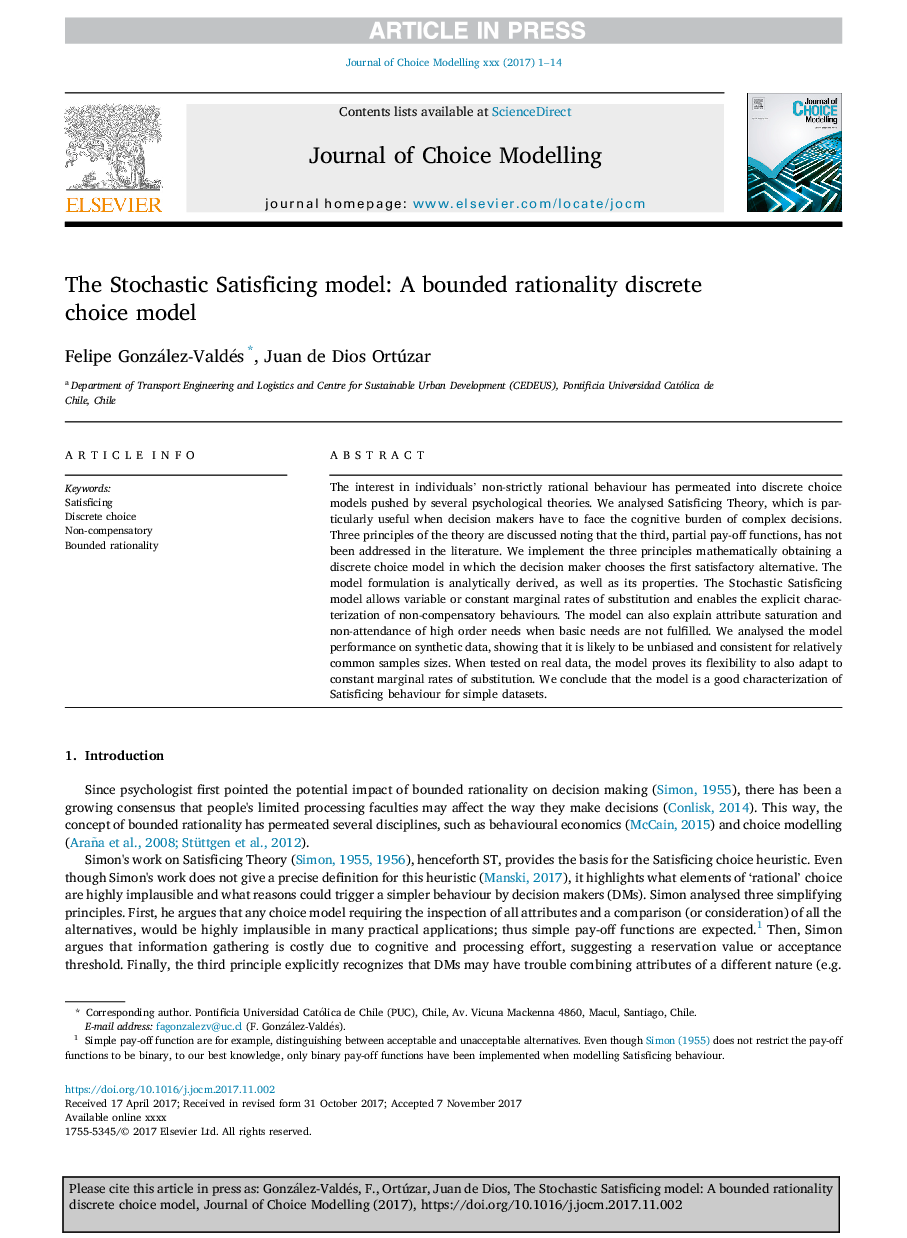| کد مقاله | کد نشریه | سال انتشار | مقاله انگلیسی | نسخه تمام متن |
|---|---|---|---|---|
| 7356816 | 1478387 | 2018 | 14 صفحه PDF | دانلود رایگان |
عنوان انگلیسی مقاله ISI
The Stochastic Satisficing model: A bounded rationality discrete choice model
ترجمه فارسی عنوان
مدل رضایت تصادفی: یک مدل انتخاب گزاره ای معقولانه محدود
دانلود مقاله + سفارش ترجمه
دانلود مقاله ISI انگلیسی
رایگان برای ایرانیان
کلمات کلیدی
رضایت، انتخاب گسسته، غیر جبرانی، عقلانیت محدود،
ترجمه چکیده
علاقه به رفتارهای غیر منطقی افراد، به مدل های انتخابی گسسته تحت تاثیر نظریه های روان شناختی نفوذ کرده است. ما نظریه رضایت را تحلیل کردیم که بسیار مفید است وقتی که تصمیم گیرندگان باید با بار شناختی تصمیمات پیچیده مواجه شوند. سه اصل از نظریه بحث می شود و اشاره دارد که توابع سوم، بخشی بازپرداخت، در ادبیات مورد توجه قرار نگرفته است. ما سه اصول را به طور ریاضی به دست می آوریم که یک مدل انتخاب گزینشی به دست می دهد که در آن تصمیم گیرنده اولین گزینه جایگزین را انتخاب می کند. فرمول بندی مدل از لحاظ تحلیلی مشتق شده است، و نیز خواص آن. مدل رضایت تصادفی اجازه می دهد تا متغیر یا ثابت ثابت حاشیه جایگزینی و ویژگی های صریح رفتار غیر غرامت را قادر می سازد. این مدل همچنین می تواند ویژگی اشباع و عدم حضور در نیازهای بالا را هنگامی که نیازهای اساسی انجام نمی شود توضیح دهد. ما عملکرد مدل را بر روی داده های مصنوعی تجزیه و تحلیل کردیم و نشان دادیم که احتمالا برای نمونه های نسبتا معمول نمونه ها بی طرف و سازگار است. هنگامی که با داده های واقعی آزمایش می شود، مدل انعطاف پذیری آن را نیز به انطباق با نرخ های ثابت حاشیه جایگزینی نشان می دهد. ما نتیجه می گیریم که این مدل یک توصیف خوب رفتار رفتار رضایت بخش برای مجموعه داده های ساده است.
موضوعات مرتبط
علوم انسانی و اجتماعی
مدیریت، کسب و کار و حسابداری
بازاریابی و مدیریت بازار
چکیده انگلیسی
The interest in individuals' non-strictly rational behaviour has permeated into discrete choice models pushed by several psychological theories. We analysed Satisficing Theory, which is particularly useful when decision makers have to face the cognitive burden of complex decisions. Three principles of the theory are discussed noting that the third, partial pay-off functions, has not been addressed in the literature. We implement the three principles mathematically obtaining a discrete choice model in which the decision maker chooses the first satisfactory alternative. The model formulation is analytically derived, as well as its properties. The Stochastic Satisficing model allows variable or constant marginal rates of substitution and enables the explicit characterization of non-compensatory behaviours. The model can also explain attribute saturation and non-attendance of high order needs when basic needs are not fulfilled. We analysed the model performance on synthetic data, showing that it is likely to be unbiased and consistent for relatively common samples sizes. When tested on real data, the model proves its flexibility to also adapt to constant marginal rates of substitution. We conclude that the model is a good characterization of Satisficing behaviour for simple datasets.
ناشر
Database: Elsevier - ScienceDirect (ساینس دایرکت)
Journal: Journal of Choice Modelling - Volume 27, June 2018, Pages 74-87
Journal: Journal of Choice Modelling - Volume 27, June 2018, Pages 74-87
نویسندگان
Felipe González-Valdés, Juan de Dios Ortúzar,
